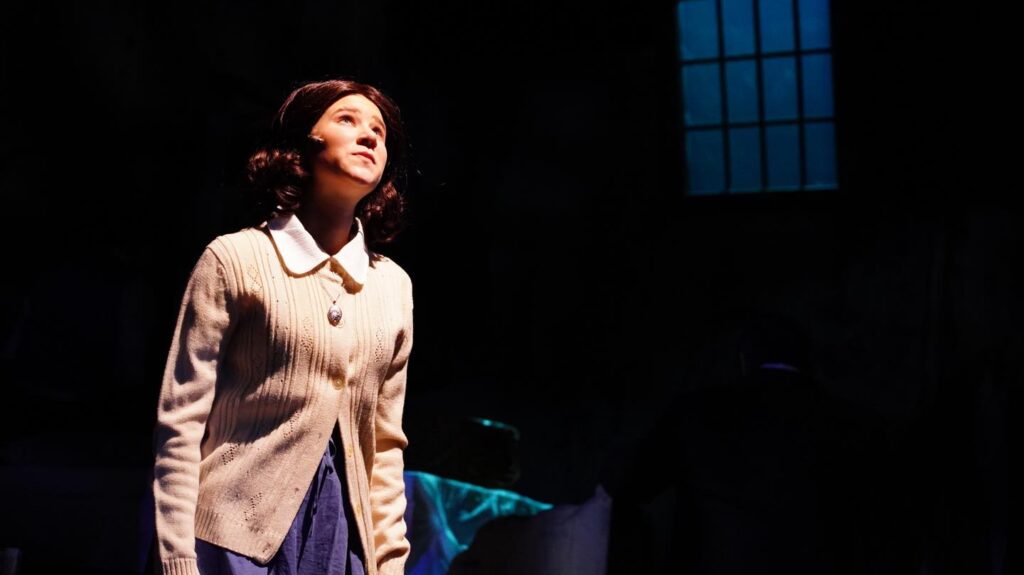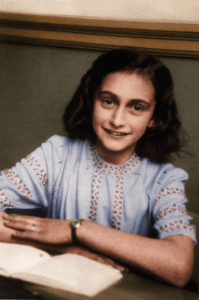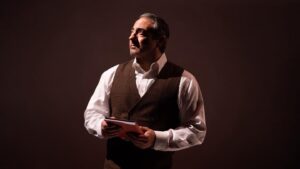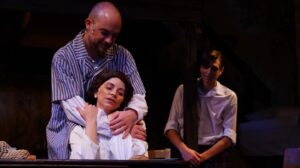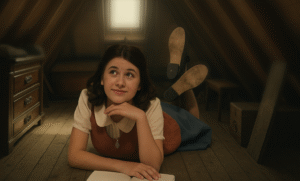Reviewed by Suzanne Angeo (American Theatre Critics Association)
Visceral, Luminous “Diary”
“When I write I shake off all my cares. But I want to achieve more than that. I want to be useful and bring enjoyment to all people, even those I’ve never met. I want to go on living even after my death!”
—Anne Frank, from her diary
The Diary of Anne Frank is perhaps the most important play ever performed at Avon Playhouse, and every bit as relevant in today’s times as it was when the gifted young writer, Anne Frank, first took up her pen to write about her experiences in her diary 83 years ago. Superlatives won’t do it justice, but here’s an attempt: from beginning to end, it is a flawless testament to human courage, optimism and resilience in its purest form – from the heart of a young teenager. At the opening scene, and again at the very end, Anne is holding her diary out to us, inviting us to share, to learn from history and not repeat its mistakes.
Based on that small diary with the red plaid cover discovered shortly after the end of World War II, Anne Frank was published in book form in 1947 under the title The Diary of a Young Girl by Anne Frank. Then in 1955, it was adapted into a sensational play by husband-and-wife team Albert Hackett and Frances Goodrich, who went on to win a Pulitzer Prize for their work. The play was directed by Garson Kanin and nominated for five Tony Awards, winning for Best Play.
Set in Amsterdam between 1942 and 1945, the stage is a portal to history through Anne’s eyes, allowing us to witness what happens when fascism and hatred rule a society. We see eight Jewish people secreted away from the Nazis, for more than two years, in a tiny attic apartment above the warehouse where Mr Frank has a spice business. Nerves are on edge, relationships are strained under the unbelievable pressure. And the vortex around which the entire story revolves is the brilliant and vivacious Anne. Bouncing off the walls like a pinball, she struggles with family tensions, night terrors, jealousy, first love, her changing body, and being forced to grow up much too quickly.
Her father Otto, who is her confidante, is a rock of stability. The relationship with her mother Edith is at the breaking point. Her older sister Margot is a wallflower compared to Anne but is a source of comfort. Another family sharing the “secret annex” are Mr and Mrs Van Daan and their 16-year-old son Peter, who becomes Anne’s first crush. A late addition to the group is a shy dentist, Mr Dussel, who ends up sharing a room with Anne (to her great chagrin). Hiding them from the Gestapo are their saviors, a young Dutch lady named Miep Gies and Mr Krahler, both employees of Mr Frank. They are risking their own lives to save the eight Jews who depend so utterly upon them. Their link to the world is a small radio that offers music, news of the war and life outside. They wait, and wait, for peace.
Eighth-grader Charlotte Bondy is simply incandescent as Anne. She has captured this role completely as we watch her character develop from a shrieking, obnoxious child into a thoughtful and idealistic young woman. Michael Zois as Anne’s father Otto, who has the heaviest role to bear, offers a quiet dignity and wisdom. Her mother, played by Lisa “D” Denomme, displays alternating flashes of temper and patience. Maia Fetter is a sweet presence as the calm and soft-spoken Margot. Nicholas Furwa gives a solid performance as Peter, showing tentative affection and exasperation towards Anne, and everyone else. His parents, the Van Daans, played by Erica Suszek and Brandon Niemi, have deep conflicts of their own that explode like fireworks. Tagg Smith is convincing as the hapless bystander Mr Dussel. Judy Privasky as Miep and Steve Grady as Mr Krahler deliver strong and sympathetic performances.
Award-winning Angel Maclean (Crimes of the Heart) has performed in theaters around the country, including the Kennedy Center. As director for Anne Frank, she has made some bold and powerful choices in her approach to this show. She keeps the pacing taut as a drum, which makes for a riveting experience, with sights (spotlights, mist) and sounds (radio, church bell, door buzzer) marking key moments and intervals in the fugitives’ lives. The entire cast of annex residents is always onstage, even during intermission, where they continue their lives in pantomimed vignettes. We are only alerted to the beginning of Act II, which opens on New Years Day 1944, by the music. Detailed period costumes by Kelly Miller, the two-story set by Jeff Stillman, the all-important lighting by JD Deierlein, sound design by Nick Kibler and furnishings by Joy Oetjens all serve to transport you to the annex in Amsterdam of so long ago.
At the very end, with a final monologue, you could hear stifled sobs and sniffles throughout the theater. The heartbreak was complete. Disturbing and enlightening, The Diary of Anne Frank is not to be missed. The sacrifices, the conflicts, the moments of despair – all are recorded so eloquently by Anne in her diary. But she remains ever-hopeful, writing “In spite of everything, I still believe that people are really good at heart.”
Note: The Sunday, November 16 performance of The Diary of Anne Frank will be followed by a special talk-back with cast and designers and an educator from the Zekelman Holocaust Center.
Now through November 22, 2025
Tickets $28.00
Avon Playhouse
1185 Washington Rd
Rochester Hills, MI 48306
(248) 608-9077
www.avonplayers.org
Avon Players Theatre is a registered 501(c)3 non-profit organization


